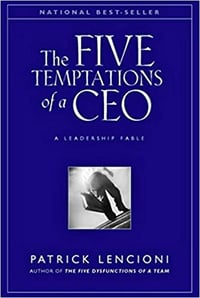 As a leader/CEO, we can trip when we get too comfortable and fail to maintain our self-awareness.
As a leader/CEO, we can trip when we get too comfortable and fail to maintain our self-awareness.
I’m not a big fan of fables, however, the brief succinct message from Patrick Lencioni’s, The Five Temptations of a CEO is powerful.
Andy, or Andrew is the self-absorb, unaware CEO in the book. To skip the fable, go to the back of the book for the Model - A SUMMARY OF WHY EXECUTIVES FAIL
It’s no coincidence these Five Temptations closely relate to the Five Dysfunctions of a Team. The Five Dysfunctions of a Team is a great exercise, I’ve used, with several leadership teams to achieve superior performance and growth.
Each year read (or listen) to this book. Ask these questions to self-assess your performance and behavior.
Better yet, ask your team to help you, if they’re not afraid to share the truth with you. (See Temptation #5)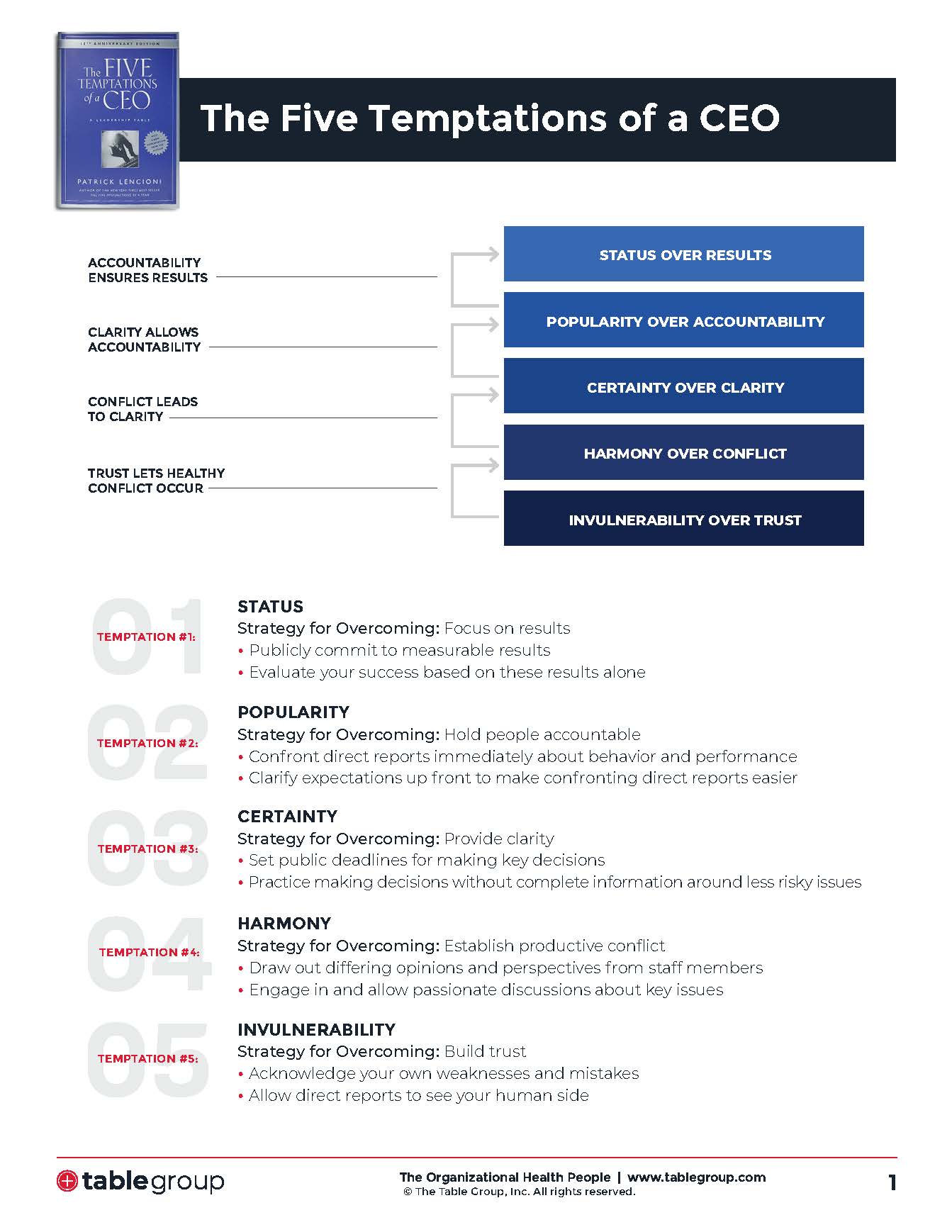
Self-Assessment Questions:
Temptation 1 Choose Results Over Status
- Do you personally consider it a professional failure when your organization fails to meet its objectives?
- Do you often wonder, What’s next? What will I do to top this in my career?
- Would it bother you greatly if your company exceeded its objectives, but you remained somewhat anonymous relative to your peers in the industry?
In the story Charlie, the “janitor” on the train, asks Andrew, “What was the best day of your career?” Because Andrew answers the day he got promoted to President, Charlie then he asks, “Why?”
Lencioni offers this advice for CEO’s: Make results the most important measure of personal success or step down from the job. The future of the company you lead is too important for customers, employees, and stockholders to hold it hostage to your ego.
Temptation 2 Choose Accountability Over Popularity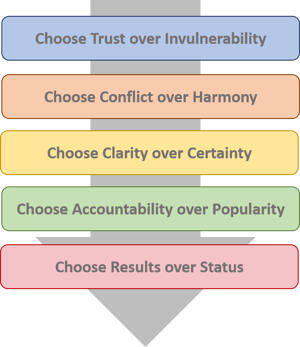
- Do you consider yourself to be a close friend of your direct reports?
- Does it bother you to the point of distraction if they are unhappy with you?
- Do you often find yourself reluctant to give negative feedback to your direct reports? Do you water down negative feedback to make it more palatable?
- Do you often vent to them about issues in the organization? For example, do you refer to your staff as “we” and other employees as “they”?
In the story Andrew believes he holds people accountable because he fired his marketing VP. Upon closer examination, he realizes, because he confided in him about his own stress levels, he failed to confront his performance failures.
CEO advice: Work for the long-term respect of your direct reports, not for their affection. Don’t view them as a support group, but as key employees who must deliver on their commitments if the company is to produce predictable results. And remember, your people aren’t going to like you anyway if they ultimately fail.
Temptation 3 Choose Clarity Over Certainty
- Do you pride yourself on being intellectually precise?
- Do you prefer to wait for more information rather than decide without all of the facts?
- Do you enjoy debating details with your direct reports during meetings?
 Andrew is analytical. He wants his decisions to be correct. That’s impossible in a world of imperfect information and uncertainty: VUCA. Andrew’s need for precision and correctness postpones decisions. The people who report to him are unclear of their deliverables.
Andrew is analytical. He wants his decisions to be correct. That’s impossible in a world of imperfect information and uncertainty: VUCA. Andrew’s need for precision and correctness postpones decisions. The people who report to him are unclear of their deliverables.
You can’t hold people accountable for things that aren’t clear. If you’re unwilling to make decisions with limited information, you can’t achieve clarity.
CEO Advice: Make clarity more important than accuracy. Remember that your people will learn more if you take decisive action than if you always wait for more information. And if the decisions you make in the spirit of creating clarity turn out to be wrong when more information becomes available, change plans, and explain why. It is your job to risk being wrong. The only real cost to you of being wrong is loss of pride. The cost to your company of not taking the risk of being wrong is paralysis.
Temptation 4 Choose Conflict Over Harmony
- Do you prefer your meetings to be pleasant and enjoyable?
- Are your meetings often boring?
- Do you get uncomfortable at meetings if your direct reports argue?
- Do you often make peace or try to reconcile direct reports who are at odds with one another?
Some CEOs believe it is better for people to agree and get along than disagree and conflict with one another.
 One of the best ways to get more comfortable with your decisions is to benefit from the best source of information available: your direct reports. Harmony sometimes restricts “productive ideological conflict,” the passionate interchange of opinions around an issue. Without this kind of conflict, decisions are often suboptimal. The best decisions are made only after all knowledge and perspectives are out on the table. Not every person’s perspective and opinion can be agreed with, but they can be considered. When all available knowledge is considered, the chances of optimal decisions are greater—not to mention the likelihood of confidence in those decisions, which is just as important.
One of the best ways to get more comfortable with your decisions is to benefit from the best source of information available: your direct reports. Harmony sometimes restricts “productive ideological conflict,” the passionate interchange of opinions around an issue. Without this kind of conflict, decisions are often suboptimal. The best decisions are made only after all knowledge and perspectives are out on the table. Not every person’s perspective and opinion can be agreed with, but they can be considered. When all available knowledge is considered, the chances of optimal decisions are greater—not to mention the likelihood of confidence in those decisions, which is just as important.
CEO Advice: Tolerate discord. Encourage your direct reports to air their ideological differences, and with passion. Tumultuous meetings are often signs of progress. Tame ones are often signs of leaving important issues off the table. Guard against personal attacks, but not to the point of stifling important interchanges of ideas.
Temptation 5 Choose Trust Over Invulnerability
- Do you have a hard time admitting when you’re wrong?
- Do you fear that your direct reports want your job?
- Do you try to keep your greatest weaknesses secret from your direct reports?
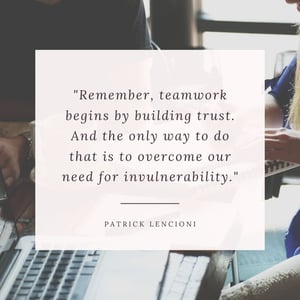 Being vulnerable with your peers and reports is not comfortable. Don’t mistakenly believe you lose credibility when your people feel comfortable challenging your ideas.
Being vulnerable with your peers and reports is not comfortable. Don’t mistakenly believe you lose credibility when your people feel comfortable challenging your ideas.
Do your people feel comfortable challenging your ideas and decisions or do they rally around your inferred opinion and conflict with one another only when it is politically expedient.
CEO Advice: Actively encourage your people to challenge your ideas. Trust them with your reputation and your ego. As a CEO, this is the greatest level of trust that you can give. They will return it with respect and honesty, and with a desire to be vulnerable among their peers.
How can your people help YOU achieve more? To create an environment where everyone is inspired to give their best, contact us today to schedule a free exploratory meeting.
Growth demands Strategic Discipline.
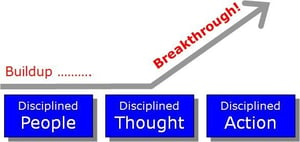 To build an enduring great organization, requires disciplined people, disciplined thought, disciplined action, to produce superior results, and make a distinctive impact in the world.
To build an enduring great organization, requires disciplined people, disciplined thought, disciplined action, to produce superior results, and make a distinctive impact in the world.
Discipline sustains momentum, over a long period of time, laying the foundations for lasting endurance.
A winning habit starts with 3 Strategic Disciplines: Priority, Metrics and Meeting Rhythms. -1.jpg?width=300&name=3%20Disciplines%20of%20Execution%20(Strategic%20Discipline)-1.jpg) Forecasting, accountability, individual, and team performance improve dramatically.
Forecasting, accountability, individual, and team performance improve dramatically.
Meeting Rhythms achieve a disciplined focus on performance metrics to drive growth.
Let Positioning Systems help your business achieve these outcomes on the Four most Important Decisions your business faces:
|
DECISION |
RESULT/OUTCOME |
|
PEOPLE |
|
|
STRATEGY |
|
|
EXECUTION |
|
|
CASH |
|
Positioning Systems helps mid-sized ($5M - $250M) business Scale-UP. We align your business to focus on Your One Thing! Contact dwick@positioningsystems.com to Scale Up your business! Take our Four Decisions Needs Assessment to discover how your business measures against other Scaled Up companies. We’ll contact you.
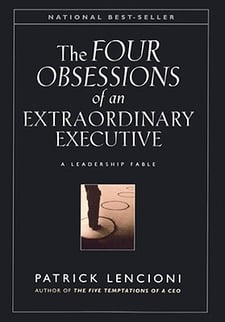 NEXT BLOG – Four Obsessions of an Extraordinary Executive
NEXT BLOG – Four Obsessions of an Extraordinary Executive
Much like The Five Temptations of a CEO, The Four Obsessions of an Extraordinary Executive reinforce the same principles. There’s a lot of emphasis on digital transformation today. Still the Fourth Obsession: REINFORCE ORGANIZATIONAL CLARITY THROUGH HUMAN SYSTEMS, remains just as critical, and more difficult possibly with so many remote workers.






.jpeg?width=150&height=135&name=Hand%20with%20marker%20writing%20the%20question%20Whats%20Next_%20(1).jpeg)

